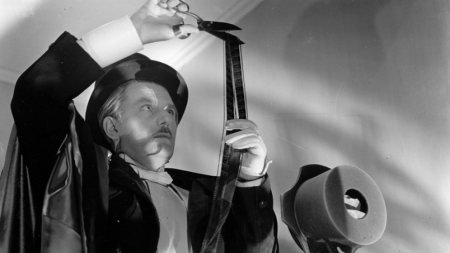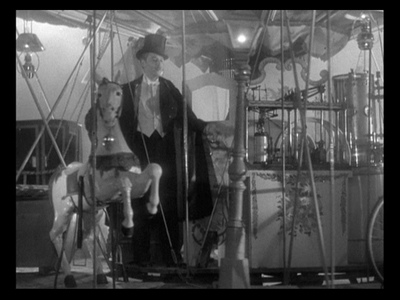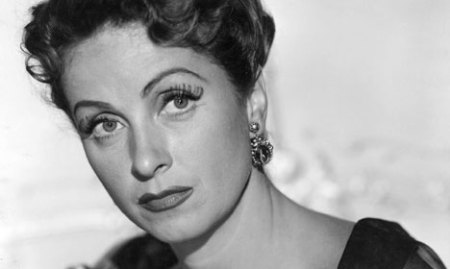
An irreverent, knowing look at casual sexual desire and infidelity in turn of the century Vienna, Max Ophul’s La ronde is a witty, frivolous bit of cinematic confection, realised in exquisite style, if ultimately somewhat inconsequential. Based on Arthur Schnitzler’s scandalous fin de siècle play Reigen, La ronde is surprisingly risque for its 1950 release date, being far more boldly suggestive than the Hollywood pictures typical of the era. Although less openly graphic than most contemporary movies, La ronde’s flippantly acquiescent stance towards promiscuous adultery still feels rather daring.
The central, linking character of La ronde is the Raconteur (Anton Walbrook) – a sort of minor diety who possesses omniscient awareness of affairs of the heart. Skilfully played with a blend of debonair charm and carefree whimsy by Walbrook, the Raconteur symbolically rotates the carousel of love, spurring La ronde’s characters on from lover to lover as if exhanging partners in a waltz. The movie is episodic in format, with each chapter providing a brief glimpse into the interactions of two lovers. When the chapter ends, one of the lovers moves on to a fresh liaison, which then links to the next, and so on until the end of the film. A prostitute lures a lowly soldier into a quick rendezvous beneath a bridge, the soldier goes on to deceive a naive girl at a ball, the girl is a maid who has a fling with her rich young master, the young master conducts an affair with a married woman, whose husband has a young mistress, who is seeing a poet on the side, who has a liaison with an actress, who seduces a count, who then stands her up for a drunken engagement with the same prostitute who begun the chain of events in the first place.
And so the narrative comes full circle, having dizzily spanned the entire strata of Viennese society, from the lowliest in stature to the uppermost echelons. Love – or rather, with a knowing wink, its carnal expression – ultimately transcends all social boundaries. The Raconteur appears in some guise or other in every episode, sometimes nudging the characters in certain directions, at other times offering sympathetic consolation to the more crestfallen among them. More often he acts as a wry observer, furnishing piquant commentary on the passage of events. He frequently breaks the fourth wall by directly addressing the viewer, and is occasionally prone to bursts of impromptu song. His purpose is nothing other than to keep the giddy merry-go-round of fleeting affaires d’amour constantly revolving. He’s also the movie stand-in for Max Ophuls himself, the director as the omnicisceint manipulator of circumstances.

Anton Wallbrook as the Raconteur
Ophuls is not especially interested in passing any kind of moral judgement on these characters, or even delving very deep into their innermost psychological workings; rather, they are merely vessels for their desires, and therefore blind instruments of fate. Willing puppets of ardor’s merry dance, if you like. La ronde is best read not as a condemnation, but rather as a sly celebration of infidelity. It’s not viewed without consequence, but nonetheless held to be an inevitable, and therefore tacitly approved diversion from the mundane routine of duty and responsibility that constitutes the bulk of human activity. In the realm of La ronde, love is essentially indecipherable from sexual desire, and therefore something flighty and ephemeral, to be pursued with vigour and enthusiasm, but discarded immediately after consummation. The characters of La ronde are nothing if not fickle, declaring ardent passions and then just as quickly abandoning them with a vaguely uneasy distaste. It’s all in the pursuit, the thrill of the game and the all too brief moment of consummation. After that, it ceases to have any meaning.
On another, more mischievous level, La ronde can be read as a rather macabre comedy about the transmission of STD. This is not something that is directly acknowledged in the movie. But it’s impossible to watch La ronde and escape the implication all the same. The spread of syphilis was regarded with something approaching social terror in decadent fin de siècle Vienna. Perhaps even more so than the spread of HIV today. The Raconteur’s determination to keep the carousel of love moving, could be seen as the fervent attempts of the disease to propagate itself, which must infect new hosts or eventually die out. Syphilis was notorious for crossing all barriers of social class in turn of the century Europe, affecting noble and commoner alike. As we witness the characters of La ronde freely exchanging partners, shifting up and down through the various social classes, we imagine that something rather more sinister than sexual favour is being circulated. Perhaps Ophuls treatment of La ronde is ultimately too light and breezy to accept this as a definitive interpretation of the events, although apparently the implication is made much more explicit in Schnitzler’s original play.
La ronde is a movie that delights in impish visual jokes. In one of the more amusing moments, Daniel Gelin’s rich young master is about to get down to business with his well-to-do paramour (played by Danielle Darrieux) only to be struck by every young man’s worst nightmare. The Raconteur’s carousel suddenly breaks down, and he finds himself unable to perform. Gags about male impotence in a film from the early fifties? Well, La ronde is that kind of movie. In another delicious moment, the Raconteur abruptly interrupts a steamy clinch, snipping away at a reel of film with a pair of scissors. The scene needed to be censored, he duly informs us. This is a film, after all, that features more sex than Debbie Does Dallas. It’s just that it all happens off the screen.
No discussion of a Max Ophuls film is complete without reference to his elegant visual style. The man was a technical virtuoso. The agility and ease of movement in his silkily smooth tracking shots would not be matched until the emergence of Stanley Kubrick; an appropriate comparison, since no other director was so strongly informed by Ophuls’ aesthetic of fluid, effortless cinematographic movement. Ophuls aims to waltz the viewer through the movie, to pirouette you dextorously through the scenes before depositing you with sure feet – if a little breathless and giddy – at the conclusion. The seductive rhythm of the waltz, in fact, is one of Ophuls’ recurring visual motifs, perhaps never more ravishingly realised than in the circling montage of dance between Vittoria de Sica and Danielle Darrieux in his acknowledged masterpiece, The Earrings of Madame de…
The Kubrick comparisons go further than the fluid visual style, however. We could also draw parallels between La ronde and Kubrick’s drastically under-appreciated final masterpiece, Eyes Wide Shut. Both films, in fact, are based on a re-imagining of source material by Arthur Schnitzler (the novella Traumnovelle in the case of Kubrick’s nightmarish fantasy). La ronde brilliantly recreates the look of turn of the century Vienna in its sumptuously realised studio sets. Eyes Wide Shut, while taking place in millenarian New York, nonetheless transposes the feel and atmosphere of decadent fin de siècle Europe into a modern day setting. Kubrick’s dream-like meditation on manipulation and desire is a considerably more dark, weighty and mysterious affair than Ophuls’ elegantly buoyant trifle, but both films deal with the nature of marriage – and infidelity – with a frank and non-judgemental perspective rarely seen in other movies. They also share the view that the desire for casual sexual satisfaction is not the exclusive province of men, but just as actively pursued by women… if perhaps a little more discreetly.
Take the uncommonly subtle bedroom conversation between La ronde’s husband and wife, Danielle Darrieux and Fernand Gravey. Both partners are cuckolding each other, and both have some sort of suspicion that they’re being cuckolded, but at the same time, they’re reluctant to openly acknowledge any kind of deceit. The conversation flirts around on the outskirts of suggestion. It becomes obvious that what they’re both really talking about is cheating on each other, but the topic is never once referred to directly. Gravey’s character appears to have an almost comically narrow perspective on what his wife – or “respectable” women in general – might be capable of getting up to. But such a perspective is really derived from his own refusal to face the truth of the matter. He’d prefer not to speculate on what his wife might be doing behind his back. She’s just an accessory to his life, bound to him by duty. Isn’t she? I’m reminded sharply of the self-satisfied Dr. Harford, taking his wife’s fidelity utterly for granted in Eyes Wide Shut.

French actress: Danielle Darrieux
Danielle Darrieux, incidentally, is one of the great actresses of her generation, and really deserves greater international recognition. She conveys s lot with subtle facial expressions. This is evident not only in her faux-innocence during the conversation with Gravey, but in her initial (feigned?) reluctance and eventual resigned acquiescense to the adulterous advances of her young suitor. There’s also, I think, a chiding rebuke hidden beneath her outwardly sincere reassurances, after he fails to perform. And doesn’t he know it!
For all of its restless grace, inventive visual style and witty observation of human sexual behaviour, there’s the sense, perhaps, that La ronde doesn’t quite manage to add up to the sum of its parts. Some of the sequences tend to ramble on for longer than is strictly necessary. We feel that, by the time we’ve absorbed each of the film’s ten chapters, the point has already been driven well and truly home. Although the performances are good, some of these characters feel a bit under realised. I’d have liked Ophuls to delve a bit deeper under the surface and get into the nitty gritty. As it is, it feels as if we’re skipping lightly over the surface of the lake, rather than taking a plunge into the depths. And perhaps this was entirely Ophuls’ intention: to portray human passion as something that is essentially trivial, a pleasing distraction, with its attendant pleasures and pains never fated to last. In dealing with his subject matter in such a breezy fashion, we don’t really get the deeper emotional heft of say, Ophuls’ own The Earrings of Madame de… But La ronde remains a clever and charming novelty all the same.


A solid review on a rather different, yet conventional movie. I plan to get my hands on this in 2 months time.
Good stuff.
before you make fun of my email address, i just wanted to say i like your blog. i admit i do not agree with most of which you say, but you are interesting to read. i think you would be a great person to get into an arguement with!
La Ronde, however, is a solid movie that is just a few scenes away from being great.
(laughs at email address)
No worries, thanks for the comments Kristos.
激安バーバリー バッグ
We are a gaggle of volunteers and opening a brand new scheme in our
community. Your web site provided us with useful information to work on.
You’ve done an impressive activity and our whole group will likely be grateful
to you.